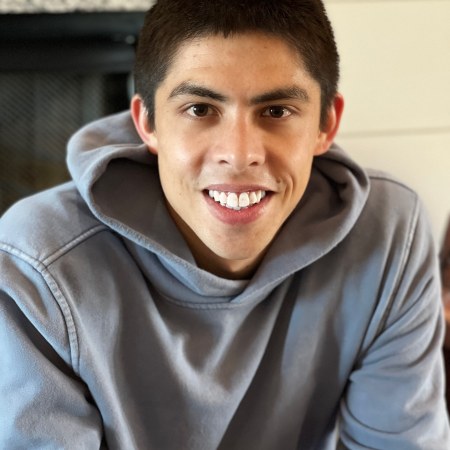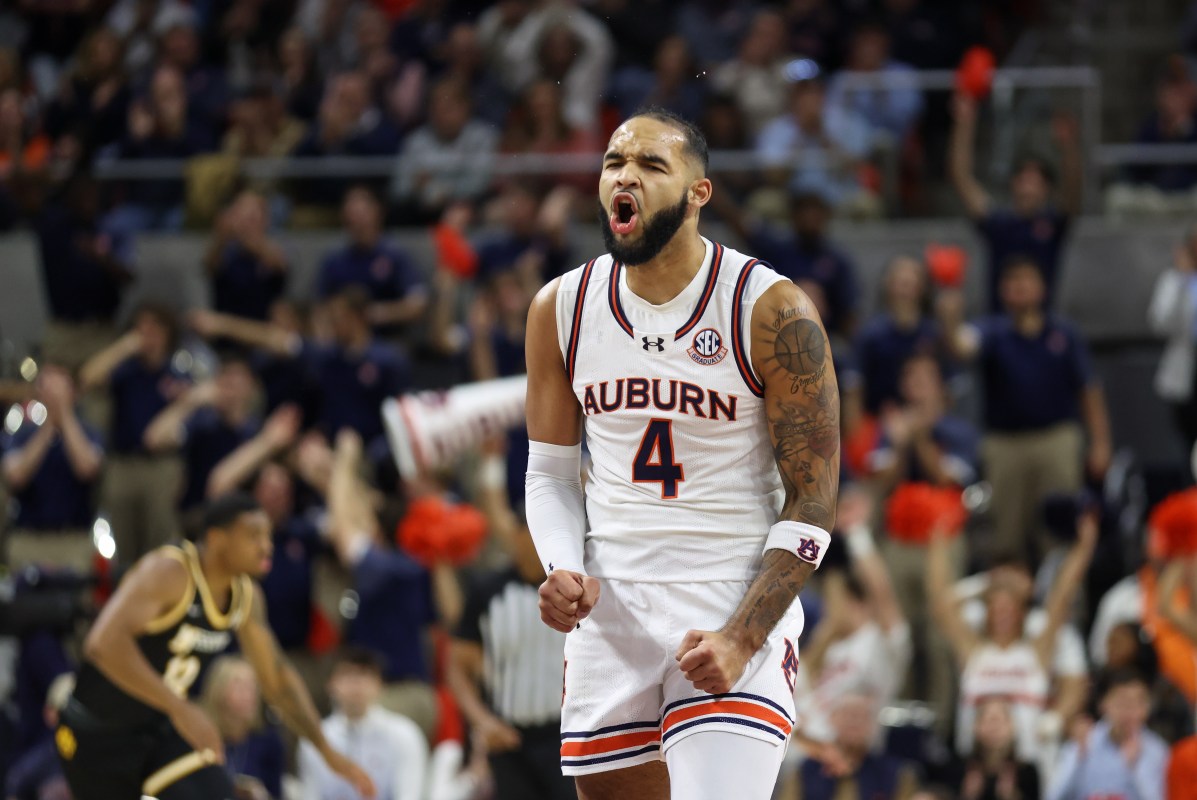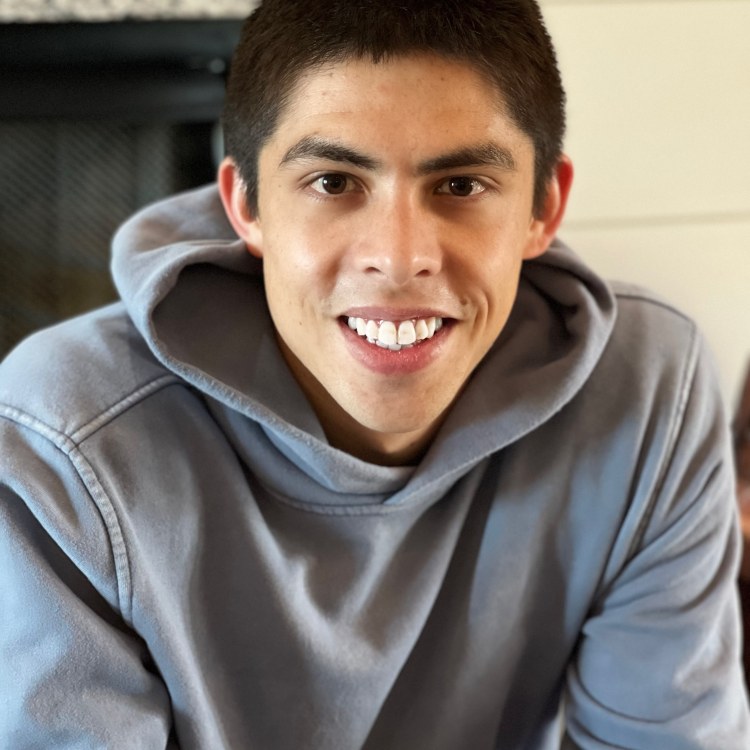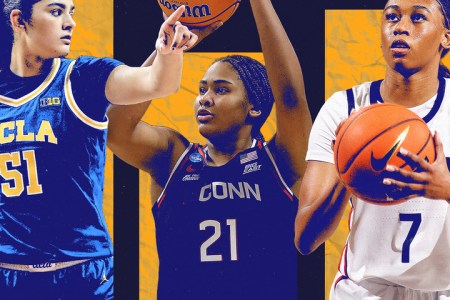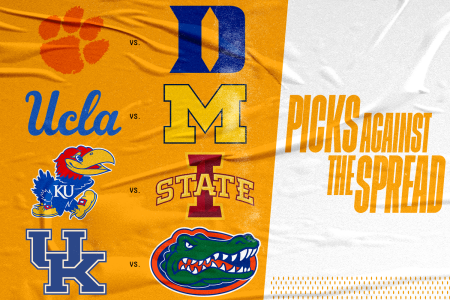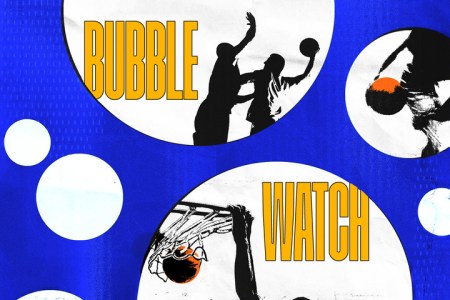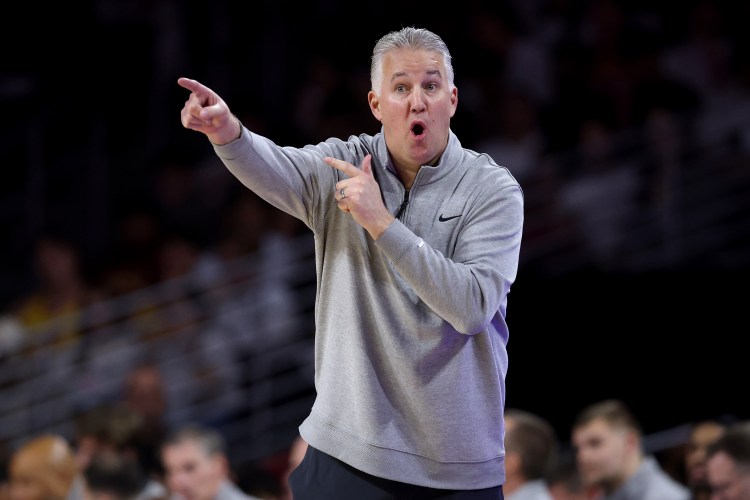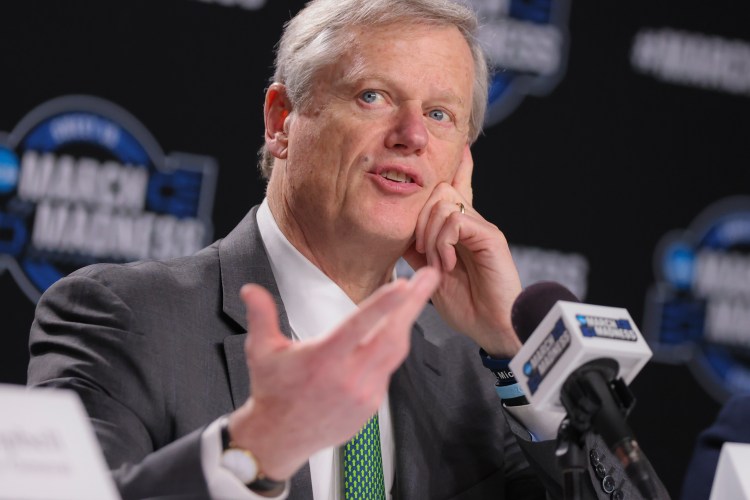Not too long ago, there were only a handful of Division I schools interested in Johni Broome.
He was a dominant 6-foot-9 forward at Tampa Catholic High School, averaging 15.5 points and 10.5 rebounds per game as a junior. And yet, his scholarship options were limited to five mid-major programs: Morehead State, Florida Atlantic, Jacksonville, Georgia Southern and Bryant. Even South Florida, which is a mere 15-minute drive from Tampa Catholic, didn’t recruit him. “Always been overlooked, always been an underdog,” Broome tells Hoops HQ. “Even to this day, I feel like I’m overlooked a lot.”
Yes, even now, as the centerpiece of the No. 2 team in the country and the frontrunner for national player of the year, Broome feels as though he has something to prove. “While the world may see him as one of the more dominant players in college basketball, he still sees himself as that guy that needs to show you,” Auburn head coach Bruce Pearl says. And show he has, averaging 18.6 points, 11.1 rebounds, 3.3 assists and 2.7 blocks while shooting 57 percent from the field. Broome ranks first in KenPom’s player of the year standings, but in his mind, there are still plenty of critics to defy. “My goal every day is to just keep trying to prove everybody wrong,” he says. “That’s all.”
Football was the primary sport in the Broome household. Johni’s older brother, John Jr., played defensive lineman for Florida International University. Johni himself prioritized football over basketball until he hit a massive growth spurt as a sophomore at Plant City High School, shooting up from 5-foot-10 to 6-foot-7. His focus then shifted entirely to hoops.
First, Broome had to learn how to play a completely different position. Up to that point, he had been a guard. “I just sat in the corner and shot threes,” he explains. “I went from that to having to do post moves and be in the paint more and all types of stuff. So it was night and day for me.”
When he transferred to Tampa Catholic ahead of his junior season, Broome wasn’t some prominent, highly sought after talent. In fact, Tampa Catholic head coach Don Dziagwa didn’t know anything about him outside of his height. “Here I am as a high school coach and I got a 6-foot-9 kid transferring in, so I’m really looking forward to seeing how good he is,” Dziagwa says. “I don’t think anybody in the local community really knew anything about him.”
Broome starred immediately for Tampa Catholic, guiding his team to the 5A state semifinals. A rail-thin 16-year-old, he wasn’t particularly strong or athletic, but he had excellent footwork and touch around the basket. Plus, his feel for the game was tremendous. “We used to joke with him that he jumps about an inch or two off the ground,” Dziagwa says. “But he would find ways to block shots and get rebounds and he had a great sense — which I still think he has — of where to be and when to be there.”
Nonetheless, Broome just wasn’t garnering the attention that he deserved from Division I programs, in large part because his game wasn’t flashy. He didn’t run the fastest or jump the highest. He rarely wowed audiences with highlight plays. He didn’t stretch the floor as well as other forwards. But he was always productive.
Broome’s father, John, would constantly ask Dziagwa, “How come schools like Kentucky and Louisville aren’t down here recruiting my son?” And Dziagwa would have to explain that, in spite of his best efforts, he couldn’t even get nearby South Florida to recruit Johni. USF coaches came to a couple practices at Tampa Catholic, but they were not impressed enough to offer Broome a scholarship.
Fortunately, a few schools did see his potential. Broome was first planning to join Florida Atlantic’s loaded 2020 class, which included guards Alijah Martin and Johnell Davis, but his spot was gone before he had the chance to commit. He was scheduled to visit campus after forward Giancarlo Rosado, who accepted the scholarship that would have belonged to Broome. With FAU off the table, Morehead State, a mid-major in the Ohio Valley Conference, emerged as Broome’s top choice.

Morehead State tended to recruit physically imposing big men, yet Broome’s combination of height and skill was too intriguing to pass up. “We as coaches are guilty of saying, ‘Well, this guy can’t do this. He isn’t this,’” says Eagles head coach Jonathan Mattox, who was then an assistant to Preston Spradlin. “Well, what can he do? We went based off that.”
Broome admits that he knew nothing about Morehead State except that former NBA forward Kenneth Faried had played there. Still, it was an exciting opportunity to lift up a program that had not posted a winning record in four years. Broome committed just before his senior season at Tampa Catholic, then proceeded to average 19.6 points, 10.9 rebounds and 2.2 blocks and win Hillsborough County Player of the Year.
Given how his recruitment went, Broome arrived at Morehead State with a massive chip on his shoulder. “To be honest with you, I think that really helped him,” Dziagwa says. “Sometimes that helps people when they don’t get all the accolades and they’re not the five-star right off the bat. I think it gave him a burning desire inside.”
Despite adding roughly 20 pounds of muscle over the summer, Broome was expected to come off the bench as a freshman. One of the Eagles’ starting forwards, Tyzhaun Claude, tore his ACL a couple weeks before the season was set to tip off, which left a spot for either Broome or senior LJ Bryan. On opening night, an away game against No. 10 Kentucky, Spradlin went with Bryan.
“Johni was like, Man, why am I not starting? I’m better than him,” Mattox recalls. “We as a staff wanted to lean on experience like most coaches tend to do, especially early in the season.” As Bryan’s backup, Broome logged 25 minutes and led the team in scoring with 11 points on 5 of 6 shooting to go along with five rebounds. He not only started from that point on, Broome was far and away Morehead State’s best player. He averaged 13.8 points, 9.0 rebounds and 1.9 blocks per game, winning OVC Freshman of the Year. A season after going 13-19, the Eagles finished 23-8 and won the conference tournament, with Broome taking home MVP honors. It marked the program’s first NCAA Tournament berth since 2010-11.
Mattox, who worked primarily with the big men, was struck by Broome’s ability to quickly pick up new post moves due to his elite footwork. Broome was always adding more to his arsenal on both ends of the floor. As a sophomore, he ranked ninth in the country in rebounds per game (10.5) and third in blocks (3.9) and was named OVC Defensive Player of the Year. That’s when he seriously began to consider transferring. During that time, he and Mattox shared many conversations about the various options on the table. Several blue bloods came up in those discussions and Mattox wanted to be sure that Broome was prepared to assume a diminished role wherever he might go.
“I looked at him one night and I said, ‘Hey, would you be okay with going to Kentucky and averaging eight points a game?’” Mattox says. “That was just my question to him man to man, friend to friend. I looked him in the eye and said, ‘Would you be okay with doing that?’ And he looked at me like I was crazy.”

Eight points per game? Broome was certain that wherever he went, he would average far more than that. Auburn was the eventual choice, and of course, Broome was right. Faced with the difficult task of replacing All-American center Walker Kessler, Broome thrived from day one, making the transition to a high-major look seamless. He led the Tigers in scoring, rebounding and blocked shots in his first season and made the All-SEC second team. It didn’t take long for Pearl to realize that Broome was far more athletic than his staff initially thought.
“Everybody equates being able to jump out of the gym with being a great athlete,” Pearl explains. “I know a bunch of guys who can really jump that are some of the most unathletic people in the world. All they can do is jump. They got no hands, no timing. Johni is not a big jumper but he’s got everything else. Larry Bird was a lot like that. He couldn’t jump, but he had great hands, great feel, great touch. And those are some of the things that Johni possesses as an athlete.”
Broome has continued to get stronger and incorporate new elements to his game, including a three-pointer, since joining the Tigers. He has taken advantage of all the resources available to him and employed his own private trainer and shooting coach. Perhaps most importantly, he has matured into a leader. At Morehead State, Broome would often get frustrated when Spradlin subbed him out, or he wasn’t receiving enough touches, or the refs made a bad call. “He’s really come a long way in his ability to overcome and handle adversity,” Mattox says. Broome has become the ultimate teammate, currently averaging a career-high and team-leading 3.3 assists per game.
“I think when Johni was younger, scoring mattered a great deal to him,” Pearl says. “Now his defense, his passing, his ball handling, his leading and his scoring matter. In other words, he has understood that his team won’t win if he just scores. He’s got to do everything. And he’s bought into that.”
Broome has excelled in Pearl’s system, which puts a lot of trust in the big men to make plays. The offense is frequently “inverted,” as Pearl says, placing the frontcourt players on the perimeter in order to pull opposing rim protectors away from the basket. Broome’s mastery of that system is a major reason why the Tigers are 13-1 with wins over Houston, Iowa State, North Carolina, Memphis, Ohio State, Purdue and Missouri. They are ranked No. 1 in both KenPom and the NET as conference play begins.
In the offseason, Broome never contemplated transferring. He has found a home at Auburn and relishes the chance to deliver the program its first national championship. “I want to solidify myself as one of the best that came through Auburn,” he says.
The truth is, he already has. He became just the 14th player in program history to be named an All-American last season and would be the first to win the Wooden Award. But while Broome has blossomed into arguably the best college player in the nation, he is still not viewed as an elite NBA prospect. He has withdrawn his name from the past two drafts after generating little buzz and he is seldom mentioned in conversations about the stacked 2025 class. Scouting reports point to his lack of perimeter shooting as a significant concern. He is connecting on just 31 percent of his three-pointers and 60 percent of his free throws, though it is worth mentioning that he ranks second in individual offensive rating according to KenPom.
The NBA projections are just the latest in a collection of slights. Broome still feels and plays like someone who was lightly recruited out of Tampa Catholic — and he always will. “Everybody is seeing what he is doing now and that’s basically just because of the inner drive that he had going way back to high school, not getting recruited that much,” Dziagwa says.
“The chip on the shoulder, he’s going to have that from now until the day he retires from basketball,” adds Mattox. “The chip will carry him through. The mindset will carry him through. He’ll find a way to be productive wherever his next step in basketball is.”
And hey, if you don’t believe that, it’s all good with Broome. There is nothing he loves more than proving people wrong.
